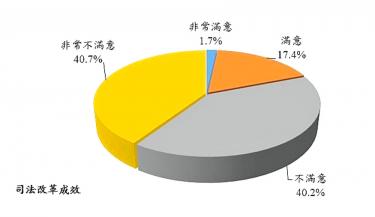Nearly 80 percent of respondents to a poll expressed doubt about the impartiality of judges, while a larger number said they were dissatisfied with judicial reform efforts, a poll released on Friday by National Chung Cheng University’s Crime Research Center showed.
The survey showed that 21.9 percent of respondents said judges conduct trials correctly, down 1.2 percentage points from a previous poll.
The government in August 2017 convened the National Congress on Judicial Reform, but 80.9 percent of respondents expressed dissatisfaction with its efforts.
Asked about countermeasures against false news reports, 81 percent of respondents said they support the government’s use of police and the judiciary, with 49.8 percent expressing strong approval.
Regarding public security, 91.3 percent, a record, said they felt safe in their neighborhoods, while satisfaction regarding public security rose 11.1 percentage points.
The poll showed that 77.5 percent of respondents were satisfied with the performance of police in maintaining public security, also a record, after a crackdown on gangs and weapons in the run-up to the local elections in November last year.
Support for improvements in salaries and welfare for police, firefighters and prison officials was high, with 87.8 percent of respondents approving.
However, when asked about the performance of prosecutors, only 32.3 percent said they were satisfied, including 2.3 percent expressing high satisfaction.
Support for the death penalty was high, with 79.6 percent disagreeing that it should be abolished, including 53 percent who expressed strong disapproval, while 26.6 percent said they disagree, but would be willing to consider other options. Only 15.7 percent supported ending capital punishment.
Meanwhile, 72.6 percent said they were dissatisfied with the government’s performance in tackling corruption, the poll showed.
Regarding the legalization of cannabis, 95.4 percent disagreed that the law should be changed, while 51.4 percent said they were dissatisfied with the government’s performance in drug prevention, but more than half said that fraud prevention was satisfactory.
Asked if they supported rules to make the personal information of sex offenders in their communities public, 72.4 percent said yes, including 45.1 percent who expressed strong approval.
The poll, which was conducted from Jan. 23 to 25, collected 1,802 valid samples and has a margin of error of 2.31 percentage points.
The survey project was convened by center director Yang Shi-lung (楊士隆), with criminology professors Cheng Jui-lung (鄭瑞隆), who is also the dean of student affairs, and Hsu Hua-fu (許華孚) as deputy conveners.
Source: Taipei Times - 2019/02/24





















